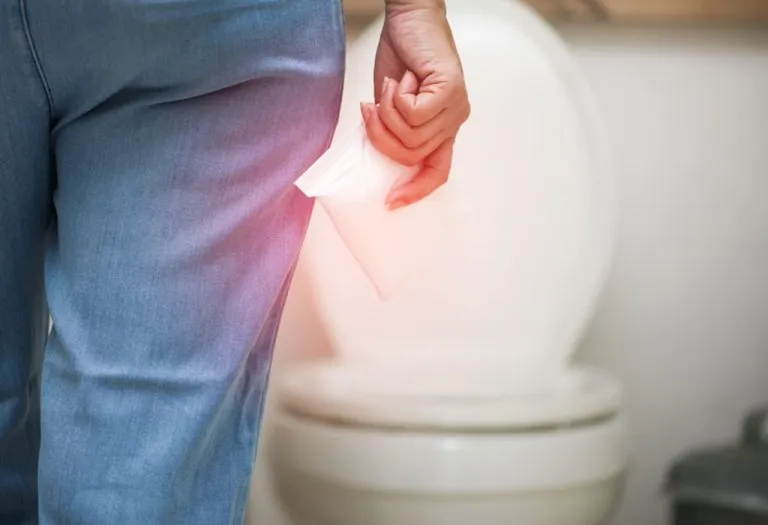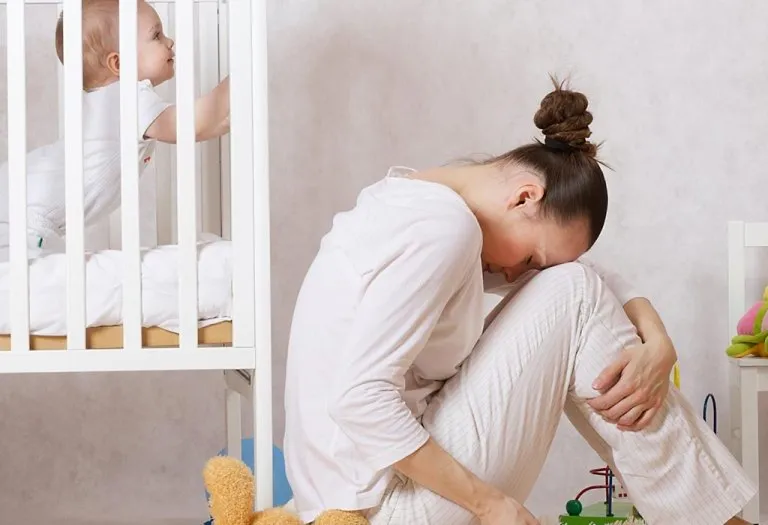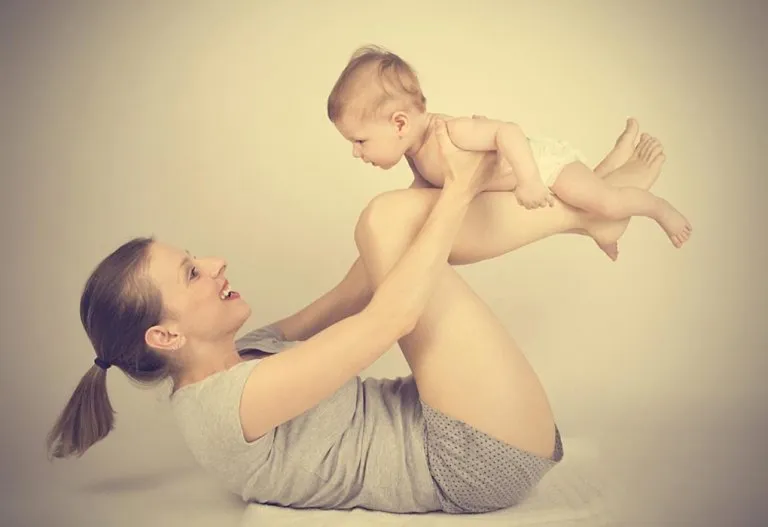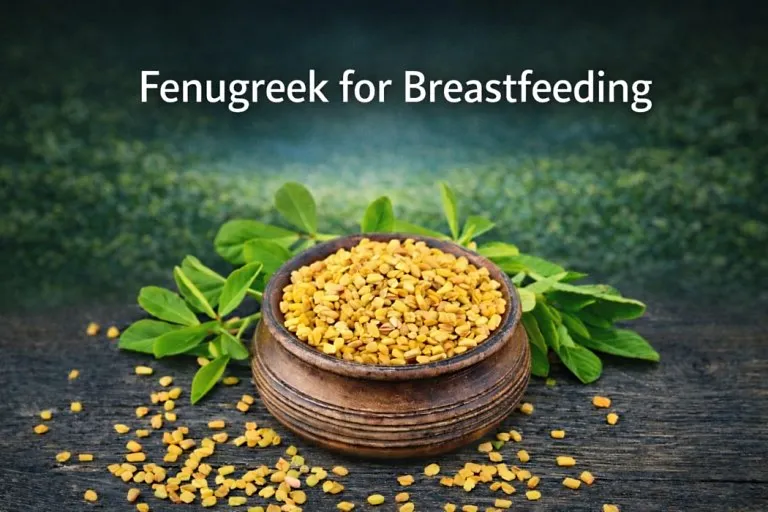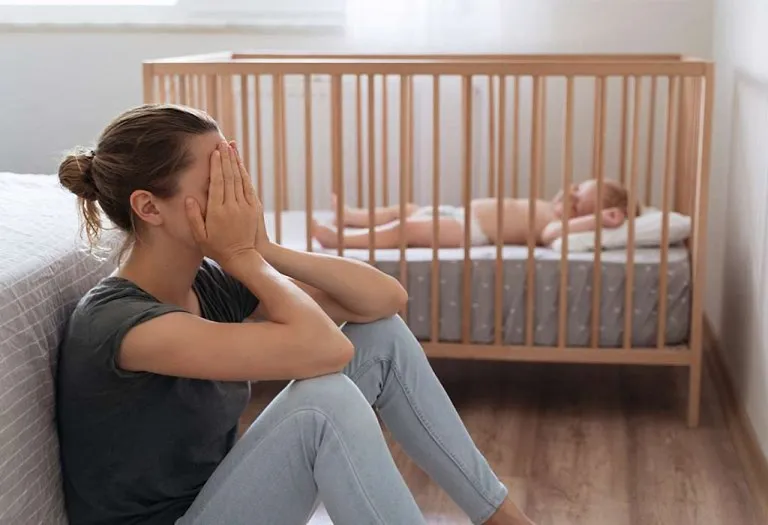First Period After Pregnancy – A Guide for New Moms
- When Do You Get Your Period After Childbirth?
- What to Expect From Your First Period After Giving Birth?
- Why Don’t Breastfeeding Moms Get Their Periods Early?
- Will Your Period Be Different After Pregnancy?
- How Long Will Your First Period Last After Giving Birth?
- How Will You Know If Something Is Wrong With Your Postpartum Period?
- Misconceptions About Periods After Childbirth
- FAQs
One of the many perks of pregnancy is – no periods for nine months! A pregnant woman enjoys a nice break from this monthly visitor, but once her baby arrives, she can expect her periods to return anytime. If you have recently given birth to an adorable little one, no doubt you must be having a great time with him. Having your period go on an extended vacation during this time must keep you extra happy. But you can expect your periods after a few weeks of your delivery. Your first period after pregnancy may come with various surprises. In order to know when you can expect your periods after this delivery, read this article. We shall discuss all that you need to know about periods after childbirth.
When Do You Get Your Period After Childbirth?
You can expect your 1st period after birth to return within 6 to 8 weeks of giving birth, i.e., if you are not breastfeeding your baby (1). For those who opt for exclusive breastfeeding, the return of your first period may be delayed for several months. If you continue breastfeeding, your period might not return for 1 to 2 years. Basically, you may not have your period until you stop breastfeeding. Exclusive breastfeeding here means that your baby is only on breast milk. In some women, periods return within a couple of months of giving birth, whether they are breastfeeding or not.
If you bottle feed or partly breastfeed your baby, you are likely to start experiencing your periods sooner than if you breastfeed exclusively (2).
What to Expect From Your First Period After Giving Birth?
The first period after pregnancy is different for different women. It can change massively, less or not at all, and you should be prepared for anything. You may have longer or shorter periods and heavier or lighter flow (3). You can also expect bleeding and vaginal discharge after giving birth, as they are very common post-pregnancy.
Whether you have had a vaginal birth or caesarean delivery, you will experience some amount of vaginal bleeding and discharge after giving birth. This is due to the shedding of the extrauterine lining and blood that your body must have acquired during pregnancy. In the initial stages, you may experience heavy bleeding and clots. The bleeding that happens until 42 days after giving birth is lochia, and it changes colour from dark red to pink to light yellowish-whitish discharge in those 42 days. You may have this discharge for up to six weeks, and if you are breastfeeding your baby, you may expect your first menstrual period after birth around this time (4).
Why Don’t Breastfeeding Moms Get Their Periods Early?
Most new mothers do not get their periods after delivery while breastfeeding fully for three to six months or longer because of the hormonal changes. This is called lactational amenorrhea. Exclusive breastfeeding means that the infant depends solely on breastfeeding for nutrition and all sucking requirements. Regular breastfeeding suppresses the release of hormones that trigger your body to start the monthly processes for a new pregnancy (5). Therefore, in the dearth of reproductive hormones, no eggs are released for fertilization. Without the egg, there is no menstruation. Thus, breastfeeding moms do not get their periods quickly.
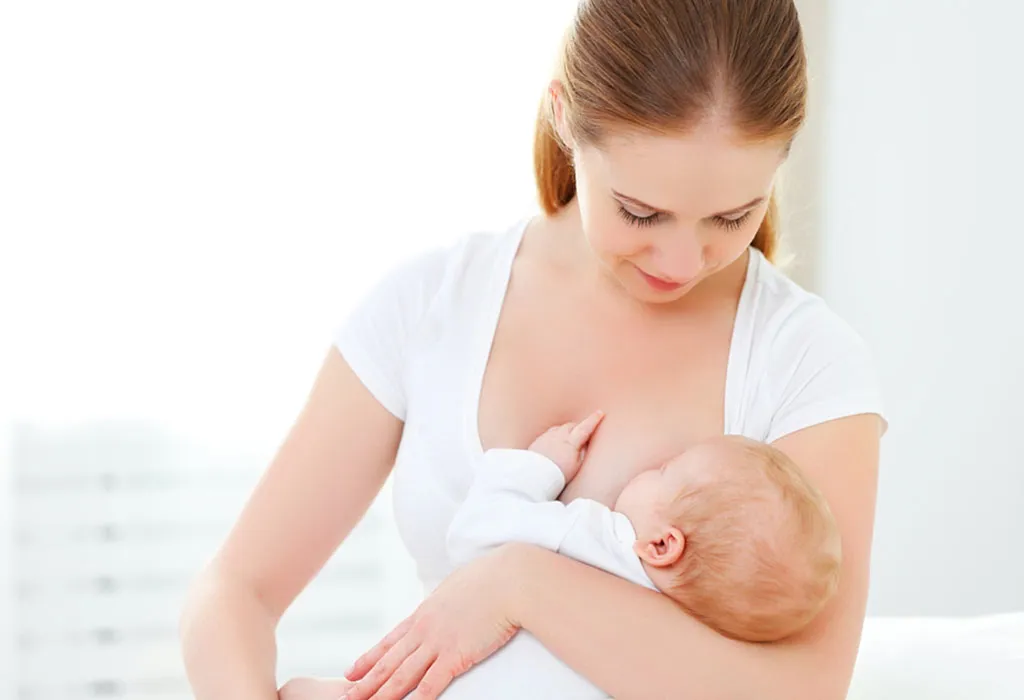
Will Your Period Be Different After Pregnancy?
Be prepared to expect and experience some changes in your period after pregnancy. This is because your body will be in the process of adjusting to your menstrual cycle after delivery. You may experience some of the following (6):
- Your first period after postpartum may be more painful than your earlier menstrual cycles.
- You may have a heavy period after pregnancy in comparison to your usual period.
- You may experience scantier or less menstrual flow than your normal period.
- You may experience more or less cramping than usual.
- You may notice small clots in the blood.
- Your cycle may become irregular.
The reason for a heavier period after delivery is the increased uterine lining. The shedding of this lining leads to heavier blood flow. In very rare cases, adenomyosis or thyroid, if they are co-existing, may cause heavy bleeding after giving birth.
On the other hand, women who have endometriosis before pregnancy may experience scantier or lighter blood flow after childbirth. There are some other rare medical conditions, such as Asherman’s Syndrome or Sheehan syndrome, which may cause lighter bleeding.
How Long Will Your First Period Last After Giving Birth?
Your 1st period after delivery may last from five to seven days postpartum, which you may be accustomed to. However, some women may experience vaginal bleeding for two to three weeks after giving birth. If you experience vaginal bleeding for more than ten days, it is recommended that you seek medical advice without further delay.
How Will You Know If Something Is Wrong With Your Postpartum Period?
If you notice the below-mentioned symptoms during menstrual cycles post-childbirth, something could be wrong with your periods, and you should seek medical help at the earliest.
- A fever
- Heavy bleeding period after pregnancy that continues for more than a week
- Severe and sudden bouts of pain
- A foul-smelling discharge
- Bigger blood clots (more than 2 cm in size)
- Pain while urinating
- Trouble while breathing
- A severe headache
All the above-mentioned may be symptoms of any medical complications, such as infection or retained placenta. Hence, one must consult a doctor at the earliest!
Misconceptions About Periods After Childbirth
There are many misconceptions associated with the return of periods after childbirth. Some of these misconceptions are as follows:
-
Many women assume that vaginal bleeding right after giving birth is their first period after delivery. However, that is not the case. It is not the first period; it is, in fact, postpartum bleeding, which includes the expulsion of extra fluids, tissues and blood from the body after delivery. The postpartum bleeding may continue for 4 to 6 weeks after childbirth.
-
It is also believed that breastfeeding is a natural form of contraception and that a woman cannot get pregnant as long as she is breastfeeding. However, it is not completely true as breastfeeding may provide only 60 per cent of protection against conception. So a woman has a good 40 per cent chance of conceiving even while breastfeeding.
FAQs
1. Does the period after childbirth affect the breast milk supply?
Your menstrual cycle may have a little effect on your breast milk supply. The period between your ovulation and when you get your menstrual days will see a lower breast milk supply. The hormonal changes along with periods may affect how your little one wants to feed, which in turn, could affect the breast milk supply (7). Adding calcium and magnesium to your diet can help maintain a steady flow of breast milk throughout your monthly cycle.
2. Do periods start immediately after delivery?
Periods typically start within six weeks of delivery. That said, the time of periods may differ from woman to woman (8).
3. Are periods painful after a C-section?
The periods after delivery are usually heavy and painful, irrespective of normal delivery or C-section (8).
4. Can I conceive after delivery before getting my period?
Yes, it is possible to conceive again before your first postpartum period if you ovulate on schedule. However, you won’t be fertile right after giving birth (8).
5. Can less breastfeeding or pumping cause your period to return soon?
The likelihood of getting your period soon as you breastfeed less is high. This is common after your baby starts consuming solids, other than solely relying on breast milk. Your baby might reduce nursing due to the return of your menstrual cycle. However, it is more likely that your cycle has returned because your baby has begun nursing less or you have started pumping less (9).
A woman’s body undergoes a lot of changes during pregnancy and post-pregnancy. If you have recently given birth to your little one, your body will take some time to adjust to the usual routine of your menstrual cycle. Your periods will return soon, so don’t panic if you are a few weeks late. Make sure you use contraception. When your first period comes, it may be either too heavy or too light – don’t worry, it’s normal. But if you experience anything out of the ordinary during your menstrual period, do not hesitate to seek medical assistance. It is best to seek medical advice and avoid complications.
References/Resources:
1. Obstetrics & Gynecology – Return of Ovulation and Menses in Postpartum Nonlactating Women
2. Pregnancy, Birth and Baby – Periods after pregnancy
3. Cleveland Clinic – Do Your Periods Change After Pregnancy?
4. UPMC – What to Know About Periods After Pregnancy
5. La Leche League International – Menstruation and Breastfeeding
6. UT Sourthwestern Medical Center – Will my period change after pregnancy?
7. HealthDirect – Periods while breastfeeding
8. CK Birla Hospital – Worried about first period after delivery?
9. La Leche League Canada – Menstruation and Ovulation – The impact on milk production
Also Read:
Stomach Pain after Pregnancy
Precautions to Take after Delivery
Body Changes after Delivery of the Baby
Was This Article Helpful?
Parenting is a huge responsibility, for you as a caregiver, but also for us as a parenting content platform. We understand that and take our responsibility of creating credible content seriously. FirstCry Parenting articles are written and published only after extensive research using factually sound references to deliver quality content that is accurate, validated by experts, and completely reliable. To understand how we go about creating content that is credible, read our editorial policy here.






